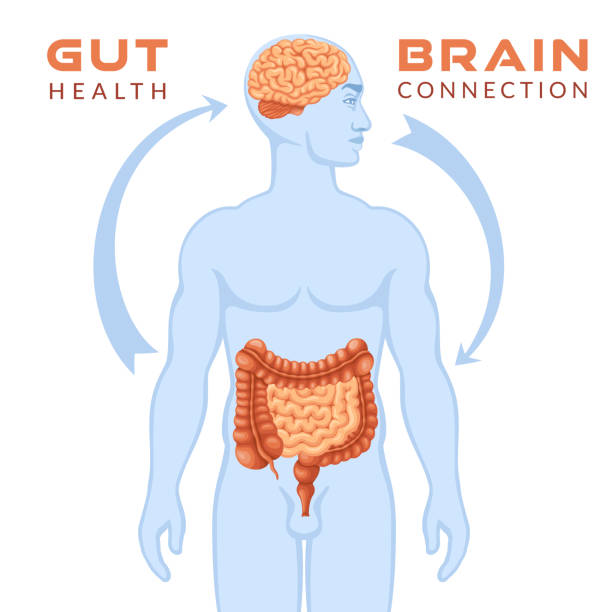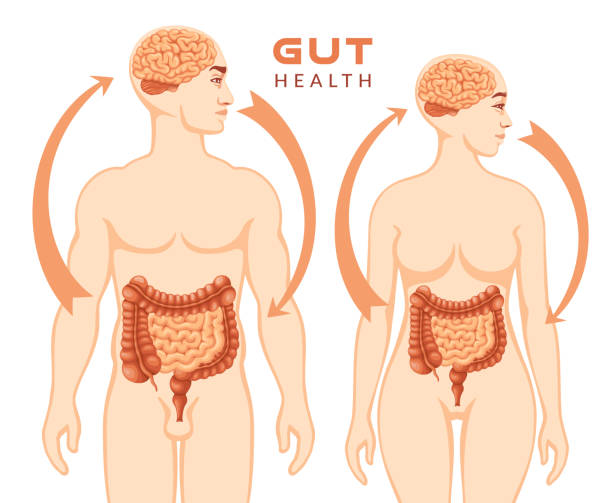"Table of Contents"
- 1 What is the Gut-Brain Connection?
Introduction:
Did you know that your gut and brain are in constant communication? This connection, often referred to as the gut-brain axis, is a fascinating and complex system that significantly impacts your mental well-being.
Understanding how your gut health affects your brain can help you make better choices for your overall health. The gut-brain connection describes the two-way communication system between your digestive system and your brain.
Learn more about the “The Gut-Brain Connection:” and its advantages in the review below!

What is the Gut-Brain Connection?
The gut-brain connection refers to the bidirectional communication between your gastrointestinal tract and your brain. This interaction occurs through various pathways, including neural, hormonal, and immune signals, which allow the gut and brain to influence each other’s functions.
The Role of the Gut Microbiome
Your gut microbiome consists of trillions of microorganisms, including bacteria, viruses, and fungi, that live in your digestive tract. These microorganisms are essential for your health, helping with digestion, synthesizing vitamins, and bolstering your immune system.
Remarkably, they also have a profound impact on your brain function and mental health.
The Vagus Nerve: The Superhighway
One of the primary communication routes between the gut and brain is the vague nerve. This long nerve runs from your brainstem to your abdomen, acting as a superhighway for signals between the gut and brain. It helps regulate numerous vital bodily functions, including mood, immune response, and digestion.
Neurotransmitters and the Gut
Neurotransmitters are chemicals that transmit signals in the brain, and many of these are produced in the gut. For example, about 90% of serotonin, a neurotransmitter that regulates mood, is made in the gut. This connection explains why gut health can significantly influence your mental state.
Nagano Lean Body Tonic Review 2024-Benefits, Pros & Cons, Customer Complaints
The Impact of Diet on Gut Health
Your diet is crucial in shaping your gut microbiome.. Eating a variety of fiber-rich foods, such as fruits, vegetables, and whole grains, promotes a healthy gut. Conversely, a diet high in processed foods and sugar can disrupt the balance of gut bacteria, leading to poor gut health and, consequently, mental health issues.
Gut Health and Mental Disorders
The Link Between Gut Health and Anxiety
Studies have shown that individuals with anxiety often have imbalances in their gut microbiome. The gut produces several neurotransmitters that influence anxiety levels, and an unhealthy gut can lead to increased anxiety symptoms.
The Link Between Gut Health and Depression
Similarly, there is a strong connection between gut health and depression. An imbalance in gut bacteria can affect the production of neurotransmitters like serotonin and dopamine, leading to depressive symptoms.
Other Mental Disorders Associated with Poor Gut Health
Beyond anxiety and depression, poor gut health is linked to other mental disorders, such as bipolar disorder, schizophrenia, and autism spectrum disorders. Research in this area is ongoing, and scientists are continually discovering new connections.
Stress and the Gut
Stress has a significant impact on gut health. When you’re stressed, your body goes into fight-or-flight mode, which can alter gut function and disrupt the balance of your microbiome. Chronic stress can lead to conditions like irritable bowel syndrome (IBS), which is often associated with anxiety and depression.

Probiotics and Prebiotics
What are Probiotics and Prebiotics?
Probiotics are live bacteria that provide health benefits when consumed, while prebiotics are non-digestible fibers that feed these beneficial bacteria. Both play a crucial role in maintaining a healthy gut microbiome.
Their Role in Maintaining Gut Health
Incorporating probiotics and prebiotics into your diet can help balance your gut bacteria, improve digestion, and support mental health. Foods like yogurt, kefir, sauerkraut, and bananas are excellent sources of these nutrients.
Lifestyle Changes for a Healthy Gut
Diet Changes
Eating a diverse and balanced diet is key to maintaining a healthy gut. Include plenty of fiber-rich foods, lean proteins, and healthy fats in your meals.
Exercise and Its Benefits for Gut Health
Regular physical activity promotes the growth of beneficial gut bacteria and reduces inflammation. Strive for at least 30 minutes of moderate exercise on most days of the week.
The Importance of Sleep
Quality sleep is crucial for gut health. Poor sleep can disrupt the balance of gut bacteria and increase stress levels, negatively impacting your mental well-being.
Gut Health and Immune Function
The gut is home to a significant portion of your immune system. A healthy gut microbiome supports immune function by preventing the growth of harmful pathogens and reducing inflammation. Keeping your gut healthy can help you fend off illnesses and maintain overall well-being.
Signs of an Unhealthy Gut
Common symptoms of an unhealthy gut include bloating, gas, constipation, diarrhea, and abdominal pain. You might also experience fatigue, food intolerances, and mood swings. If you notice persistent symptoms, it’s essential to seek professional advice.
Tips for Improving Gut Health
Practical Advice for Everyday Gut Health Maintenance
Eat a Balanced Diet: Emphasize whole, unprocessed foods.
Stay Hydrated: Drink plenty of water to support digestion..
Manage Stress: Practice mindfulness, meditation, or yoga.
Get Regular Exercise: Physical activity supports gut health.
Avoid Antibiotics When Possible: They can disrupt gut bacteria balance.
Long-Term Strategies for a Healthier Gut
Incorporate Fermented Foods: Include yogurt, kimchi, and kombucha in your diet.
Limit Artificial Sweeteners: These can negatively impact gut bacteria.
Maintain a Regular Eating Schedule: This helps regulate digestion.
The Future of Gut-Brain Research
Research on the gut-brain connection is rapidly evolving. Scientists are exploring how gut bacteria can be manipulated to treat mental health disorders and other diseases. With ongoing studies, new treatments and preventive measures are likely to emerge, offering hope for better mental and physical health.
Conclusion
Understanding the gut-brain connection reveals how integral gut health is to our overall mental well-being. By making conscious lifestyle choices, such as eating a balanced diet, exercising regularly, managing stress, and getting enough sleep, we can support a healthy gut and, in turn, a healthy mind.
FAQs
What is the gut-brain axis?
The gut-brain axis is the bidirectional communication system between the gastrointestinal tract and the brain, involving neural, hormonal, and immune pathways.
How can I determine if my gut is healthy?
Signs of a healthy gut include regular bowel movements, absence of gastrointestinal discomfort, good energy levels, and a balanced mood.
Can improving gut health alleviate anxiety?
Yes, improving gut health can alleviate anxiety by promoting the production of beneficial neurotransmitters and reducing inflammation.
What foods should I avoid for better gut health?
Avoid processed foods, artificial sweeteners, and excessive sugar, as they can disrupt the balance of gut bacteria.
How quickly can gut health improvements impact mental well-being?
Improvements in gut health can start impacting mental well-being within a few weeks, though significant changes may take longer depending on individual conditions and lifestyle factors.
Disclaimer: We are a professional product review website. We might receive compensation when you buy through our website. We may earn a small commission. The information contained on this website is provided for informational purposes only and is not meant to substitute for the advice provided by your doctor or other healthcare professional. The products have not been evaluated by the Food and Drug Administration and are not intended to diagnose, treat, cure, or prevent any disease.
